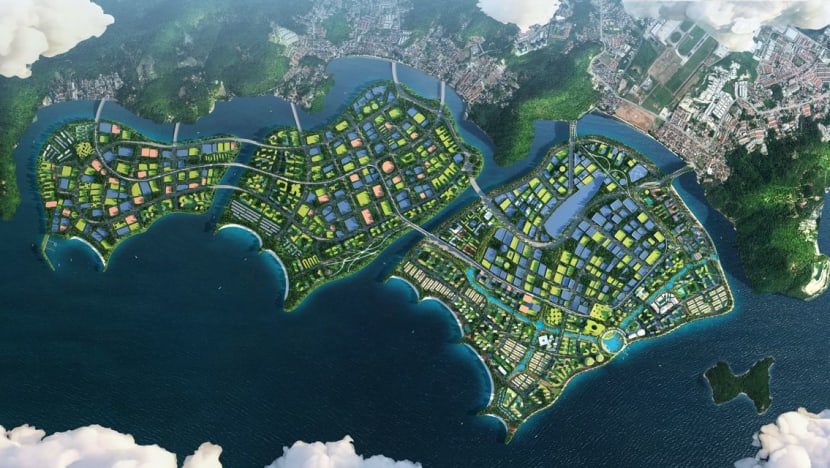Penang South Island reclamation will not affect support for Pakatan Harapan: Chief minister

The Penang South Island reclamation project aims to create three man-made islands measuring 1,821 ha near the southern tip of Penang Island. (Photo: Facebook/Chow Kon Yeow 曹觀友)
GEORGE TOWN, Penang: The Penang South Island (PSI) reclamation project will not affect local support for the Pakatan Harapan (PH) coalition in the upcoming state election, said Penang Chief Minister Chow Kon Yeow.
According to Malay Mail, Mr Chow said on Thursday (Apr 27) that PH’s victories during the 2018 and 2022 elections in Penang were proof of this.
“We have laid it out on the table (in 2018) that this is the project we want to implement and told the people to use their votes to show their support and we won by the biggest majority,” he reportedly said.
The multi-billion ringgit PSI reclamation project aims to create three man-made islands measuring 1,821 ha near the southern tip of Penang Island to drive economic and urban development.
The project is a long-term development that could take 30 to 50 years to complete with the objective of transforming Penang and addressing key challenges faced by the state, such as inadequate infrastructure for its growing population, traffic congestion and lack of jobs.
Mr Chow reportedly said that the PSI reclamation project was mentioned in the coalition’s manifesto during the 15th General Elections (GE15) in 2022.
GE15 saw the coalition defend 10 out of 13 parliamentary seats in Penang, according to the Malay Mail. At the Balik Pulau parliamentary seat where the PSR project is located, PH won with a majority of 1,582 votes.
According to the New Straits Times (NST), Mr Chow noted that the state government did not see an erosion of support from the people over the reclamation project.
"In the 2022 general election, we did not see an erosion of support as well. We have laid this project out on the table during the 2018 and 2022 elections and the majority have decided,” the chief minister said.
In a press conference on Wednesday, Mr Chow announced that Penang had finally obtained the Environmental Impact Assessment (EIA) approval for the PSI reclamation project.
He said that it came with 71 conditions to be fulfilled, adding that the state government is in the process of applying for the Environmental Management Plan (EMP) approval.
“It must be stressed that reclamation works will only start after the EMP approval is obtained. It is expected to begin in the third quarter of this year,” he said.
Mr Chow, who is also the Penang PH chairman, said that the coalition could not stop any party - either politicians or non-governmental organisations - from politicising the reclamation project.
"We have been very open about this project from the very beginning … We have nothing to hide," he was quoted as saying by NST on Thursday.
The controversial project has been criticised by environmentalists and fishermen as being a potential environmental disaster.
They warned that the massive land reclamation project would harm the marine biodiversity, ruin a rich fishing ground and destroy the coastal fishing that has nurtured generations of fishermen and provided a vital food source for the people in Penang.
According to NST, the project is located in a Malay-majority area, which the Perikatan Nasional (PN) coalition is hoping to win in the upcoming state polls.
In a recent interview with CNA, Mr Chow said that he was “mindful” of “talk outside” that PN has a growing influence in Penang.
However, citing a survey that was commissioned by the state government, Mr Chow said Malays in Penang had a “comfort level” for his administration.
“Surprisingly, (the Malay electorate’s concerns are) not even about Malay or Islamic issues. It's more of some development issues with regard to reclamation and all those,” he said.
“So, that is in a sense good that despite PN giving the impression that race and religion can win them elections, this survey among the Malay electorate suggests that they are looking at other issues”.
In Penang, the Democratic Action Party (DAP) holds 19 seats, Parti Keadilan Rakyat (PKR) has 12 seats, while Parti Amanah Negara (Amanah) has two seats. United Malays National Organisation (UMNO), whose Barisan Nasional (BN) coalition will work with PH in the state elections, holds two seats.
The elections, which observers say could happen simultaneously in July, will involve six states: Penang, Negeri Sembilan, Selangor, Kelantan, Kedah and Terengganu.
















